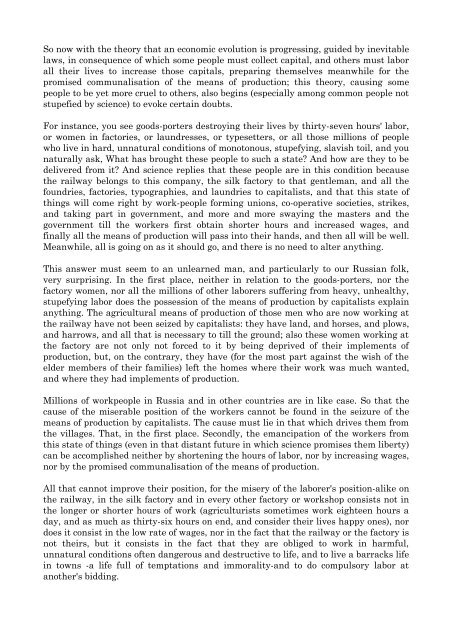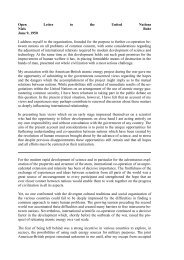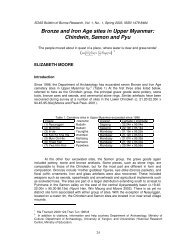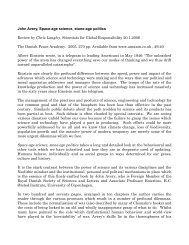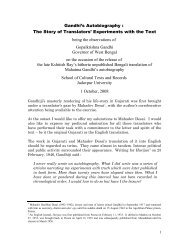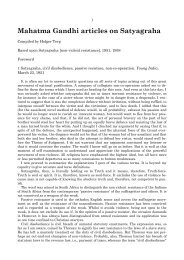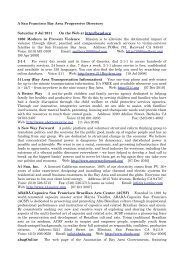THE SLAVERY OF OUR TIMES PREFACE / INTRODUCTION
THE SLAVERY OF OUR TIMES PREFACE / INTRODUCTION
THE SLAVERY OF OUR TIMES PREFACE / INTRODUCTION
You also want an ePaper? Increase the reach of your titles
YUMPU automatically turns print PDFs into web optimized ePapers that Google loves.
So now with the theory that an economic evolution is progressing, guided by inevitable<br />
laws, in consequence of which some people must collect capital, and others must labor<br />
all their lives to increase those capitals, preparing themselves meanwhile for the<br />
promised communalisation of the means of production; this theory, causing some<br />
people to be yet more cruel to others, also begins (especially among common people not<br />
stupefied by science) to evoke certain doubts.<br />
For instance, you see goods-porters destroying their lives by thirty-seven hours' labor,<br />
or women in factories, or laundresses, or typesetters, or all those millions of people<br />
who live in hard, unnatural conditions of monotonous, stupefying, slavish toil, and you<br />
naturally ask, What has brought these people to such a state? And how are they to be<br />
delivered from it? And science replies that these people are in this condition because<br />
the railway belongs to this company, the silk factory to that gentleman, and all the<br />
foundries, factories, typographies, and laundries to capitalists, and that this state of<br />
things will come right by work-people forming unions, co-operative societies, strikes,<br />
and taking part in government, and more and more swaying the masters and the<br />
government till the workers first obtain shorter hours and increased wages, and<br />
finally all the means of production will pass into their hands, and then all will be well.<br />
Meanwhile, all is going on as it should go, and there is no need to alter anything.<br />
This answer must seem to an unlearned man, and particularly to our Russian folk,<br />
very surprising. In the first place, neither in relation to the goods-porters, nor the<br />
factory women, nor all the millions of other laborers suffering from heavy, unhealthy,<br />
stupefying labor does the possession of the means of production by capitalists explain<br />
anything. The agricultural means of production of those men who are now working at<br />
the railway have not been seized by capitalists: they have land, and horses, and plows,<br />
and harrows, and all that is necessary to till the ground; also these women working at<br />
the factory are not only not forced to it by being deprived of their implements of<br />
production, but, on the contrary, they have (for the most part against the wish of the<br />
elder members of their families) left the homes where their work was much wanted,<br />
and where they had implements of production.<br />
Millions of workpeople in Russia and in other countries are in like case. So that the<br />
cause of the miserable position of the workers cannot be found in the seizure of the<br />
means of production by capitalists. The cause must lie in that which drives them from<br />
the villages. That, in the first place. Secondly, the emancipation of the workers from<br />
this state of things (even in that distant future in which science promises them liberty)<br />
can be accomplished neither by shortening the hours of labor, nor by increasing wages,<br />
nor by the promised communalisation of the means of production.<br />
All that cannot improve their position, for the misery of the laborer's position-alike on<br />
the railway, in the silk factory and in every other factory or workshop consists not in<br />
the longer or shorter hours of work (agriculturists sometimes work eighteen hours a<br />
day, and as much as thirty-six hours on end, and consider their lives happy ones), nor<br />
does it consist in the low rate of wages, nor in the fact that the railway or the factory is<br />
not theirs, but it consists in the fact that they are obliged to work in harmful,<br />
unnatural conditions often dangerous and destructive to life, and to live a barracks life<br />
in towns -a life full of temptations and immorality-and to do compulsory labor at<br />
another's bidding.


